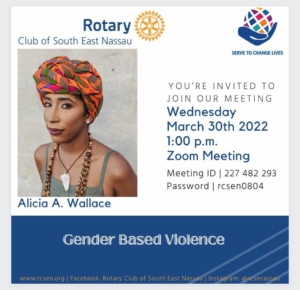The Government of The Bahamas has made the decision to be lazy and to, once again, scapegoat the Bahamian public in its attempt to provide an excuse for its refusal to perform one of its primary functions — to protect, promote, uphold, and expand human rights. It made the decision, without proper consultation with civil society, to not only shelve the marital rape bill, but to shelve the years-old Gender-Based Violence bill and instead pass the nonsense “Protection Against Violence” which makes no reference to gender and does not even have an elementary level definition of violence.
The Attorney General, in his statement intended to defend this administration, said that the public would be confused by the word “gender”. This Progressive Liberal Party-led administration has determined that “gender” is too scary a word. This comes after a Progressive Liberal Party-led administration dubbed the constitutional referendum on nationality rights a “gender equality referendum” in 2014, and after the same administration “expanded” the Bureau of Women’s Affairs into the Department of Gender and Family Affairs in 2016. Then Minister of Social Services and Community Development Melanie Griffin said the Department would “be tasked to coordinate, advocate and inform policy for, and on behalf of, women and girls and men and boys, as well as the family unit”.
At some point, the Progressive Liberal Party had at least a vague understanding of gender. It was not afraid of the word, nor was it quite this terrified by the reactions of general public to the term. It believed, it would seem, that it was possible to educate the public on gender and the importance of a gender approach in Social Services, where the Department sits, and in governance. It understood that women and men, currently the only two genders they dare to acknowledge, are perceived differently, are socialised differently, have different needs, and require different approaches to achieve particular outcomes. In fact, in the first year of monthly non-governmental organisation meetings organised by the Department, it was determined the gender-based violence was an issue that we could organise around and work to address with relative ease because people generally agreed that gender-based violence was a scourge, much like today, that needed specific attention. In fact, it was considered “low-hanging fruit”. Today, the Progressive Liberal Party does not even want the words “gender-based violence” in the bill that it led us to believe was meant to address gender-based violence.
In 2015, the Strategic Plan to Address Gender-Based Violence was published. This Plan fed directly into the 2016 drafting of the Gender-Based Violence bill. The Department of Gender and Family Affairs held meetings with regard to the bill, and one of the particular areas of focus was the development of the institutions that the bill would create including the Gender-Based Violence Authority (now absent from the nonsense “Protection Against Violence” bill). At the time of her 2017 visit to The Bahamas, the United Nations Special Rapporteur on Violence Against Women emphasized the need for comprehensive law addressing violence against women (VAW). Violence against women, it is important to note, is a form of gender-based violence. It is as important to note that women and girls disproportionately experience gender-based violence. This is not because women and girls are inherently at-risk, but because they are put at risk by harmful gender stereotypes and ideology that simultaneously suggest that women and girls should be subservient and that men and boys should be dominant and domineering. These harmful gender stereotypes reduce masculinity to violence and denigrate the feminine while putting it in opposition to masculinity.
The Bahamian public is not incapable of understanding gender. It is not necessary for everyone to study gender theory. The important piece for us to all understand is that both women and girls and men and boys are taught that they need to behave in certain ways, perform certain tasks, and occupy space in specific ways. We are all socialised and come into our gender performance based on what we see in our homes, schools, workplaces, and other places where we spend time with and are influenced by other people.
For example, girls are given dolls to pretend and practice motherhood while boys are denied dolls, even when they want to play with them. Boys are sent to play outside, allowed to run around and climb trees, and scolded for crying because that is reserved for girls. These are some of the ways to confine people, based on their gender, to particular activities, expression, and ways of being. It is not difficult to see how these seemingly small experiences from childhood are connected to the electives girls and boys choose in school, programmes they enter after high school, structure of their families and households, and their ability and willingness to negotiate salaries and seek promotions.
We can look to our own experiences to see how people treat others when they deem their behaviour or performance to be outside of the constraints outlined for all of us, and it is not difficult to see how people, frustrated by these limitations and/or failure to adhere to them, respond in violent ways, and with impunity. There is no excuse for violence. People make excuses for it quite often, and use gender to do it. In simple terms, gender-based violence is harm inflicted upon a person because of their gender or that is disproportionately experienced by people of a particular gender, and it can take various forms including verbal, physical, sexual, psychological, and financial.
We need a law that specifically addresses gender-based violence. The Gender-Based Violence Bill is not, as some people believe, focused on criminality and punishment. There is significant focus, in the bill, on creating systems that enable survivors of gender-based violence to access the services and resources they need with ease. A general violence bill entirely misses the mark. We need a system that takes care of the survivors of gender-based violence, and this can only be built on the understanding that gender-based violence is not (a subset of) general violence.
Prevention of and intervention in gender-based violence requires an understanding of and changes to societal knowledge and attitudes about gender. Collecting and analysing data on gender-based violence is critical. There can be no shortcuts. If the Government of The Bahamas is truly interested in ending gender-based violence and if it actually cares about women and girls in this country, it cannot throw its hands up and declare the people too stupid to be engaged, educated, and sensitized. It cannot be too afraid to pass laws to benefit people who are at-risk. If this administration is not prepared to legislate, make policies, and meet human rights obligations, it ought to make the way clear. There is work to be done, and we do not need seat-warmers.
But what is the difference between sex and gender?
There is a difference between sex and gender. The term “sex” is used to refer to biological characteristics which have, in recent years, been used to put people into two supposedly distinct groups — female and male. Sex is assigned at the time of birth based on the appearance of genitalia. There are two main factors that complicate sex as many understand it. One is that sex is not binary, meaning there are not just two sexes as is still indicated by many forms that have two checkboxes — one labeled female and one labeled male. The two sexes that are widely recognized are also not opposites.
Sex, while treated as though it is biological, is actually a social construct. People, many years ago decided that having specific genitalia meant that a person was a particular sex. At the same time, we all learn about sex chromosomes in grade school. As a refresher, chromosomes carry the genes that determine sex. Cells with two X chromosomes determine that a human being, and other mammals, is female. Cells with X and Y chromosomes determine that a human being, and other mammals, is male. Every person does not have XX chromosomes or XY chromosomes. Some people have XXY chromosomes, and there are other variations. In addition, some people have both ovarian and testicular tissue.
These biological differences are not in keeping with the idea that there are two sexes. Intersex people, with different chromosomes and with differences in their internal and external sex organs, exist. People are assigned “female” or “male” based on their external sex organs at the time of birth, but sex cannot be determined on a biological basis without further examination. Intersex people are sometimes incorrectly assigned “female” or “male” and later find out they are intersect, sometimes during puberty when their bodies go through changes that are considered inconsistent with their assigned sex. In some cases, where there is a noticeable difference in genitalia such as a newborn having both, doctors, based on their own assessment of which one is most dominant, preform a procedure to disguise the other, and this can result in complications later on as genitalia are not the only factor in sex.
The insistence that there are only two sexes excludes intersex people in many ways, and it continues a harmful ignorance that can be violent. In reading the description of the biological differences that intersex people may have, another word may have come to mind that was widely used decades ago. “H———–e” is a derogatory word and is no longer to be used. The appropriate word and sex is “intersex.”
Gender is not the same as sex. Gender refers to the socially constructed characteristics (constraints) and behaviours required of people based and the relationships between people based on their assumed sex. Society decided, and continues to decide, how people should be in the world, and this can vary greatly from one region to another and from one country to another. In some places, like The Bahamas and many countries in the Caribbean, people have difficulty understanding and accepting that there are more than two genders. In other countries, like India, there is an officially recognised third gender. In other places, through a combination of education, sensitisation, advocacy, and interest in respecting the humanity of people, people understand that gender is spectrum and gender should not be forced upon anyone or used as a weapon against anyone.
We have a long way to go. We obviously do not have a government that is prepared for the journey. Civil society has to step up. If you’re interested in learning more and doing more, get in touch with Equality Bahamas at equalitybahamas@gmail.com.
Published in The Tribune on August 9, 2023





